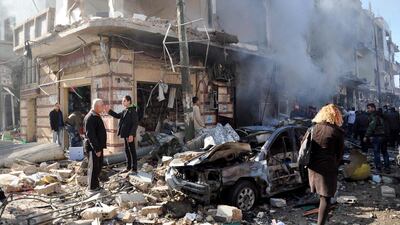With only a couple of days left in 2015, it is safe to say that it was a gloomy year for the Arab world in general.
“Bloody conflicts continue to permeate through the Arab landscape amid a growing incapacity to find solutions, which has opened the way for even more foreign interference, leading to humanitarian disasters,” noted Ahmed Yussef Ahmed, a columnist in Al Ittihad, the Arabic-language sister newspaper to The National.
Despite the tragic overview, there have nonetheless been a few positive developments that show some light at the end of the tunnel.
The Syrian crisis continues to fester because it became clear that Iran is actively participating in the conflict and, more recently, has been joined by the Russian military.
In Yemen, the Houthis attempted to achieve their scheme to gain legitimacy and control all of Yemen, prompting a resounding response from the Saudi-led coalition that is seeking to restore stability.
Libya, ever more vulnerable with spreading armed militias threatening the country’s unity, became the third Arab country after Iraq and Syria to become a stronghold for ISIL.
All this is amid the obvious incapacity of the Arab League, which seems to have given up any role in seeking to find solutions.
But there were positive developments, too, albeit incomplete, the writer noted.
The Saudi-led Arab coalition countered the Houthi insurgency in Yemen. Had the Houthis been allowed to bring their goal to fruition, it would have been a new achievement for Iran and would have presented a constant and direct threat to Saudi’s security and regional stability.
“This proves that the Arab system can deter foreign infiltration attempts that have been witnessed in various parts of the Arab region,” he said.
As the year comes to an end, there is a glimmer of hope that possible solutions might have begun to emerge to the devastating crises in the Arab world.
In Syria, an agreement was reached on the principle of negotiation between the regime and the opposition. In Yemen, talks between warring parties have begun, and Libya is preparing for a national unity government.
“These are promising steps in the right direction, although they are still far from fruition, “ he noted.
Elias Harfoush, a columnist in the London-based daily Al Hayat, also looked back at 2015.
“If I were to choose one word that summarises this year, it would be ‘refugees’.”
Thousands of images depicting convoys of refugees braving the high seas in search of safety are the most eloquent expression of the tragic conditions in our region, where death is a daily threat and people are prepared to forsake everything to survive.
“Refugees is one word that expresses the scope of the disaster that befell our societies,” he said.
“These are people born in countries that repel their own and who leave their birthplace in search of a decent life in European countries that have always welcomed those in need and have established a culture that allows for the assimilation of people from different backgrounds.
“But even this culture of assimilation is threatened because of fear and security concerns spread by terrorist organisations.”
Translated by Racha Makarem
RMakarem@thenational.ae

